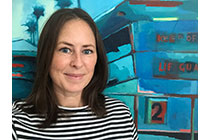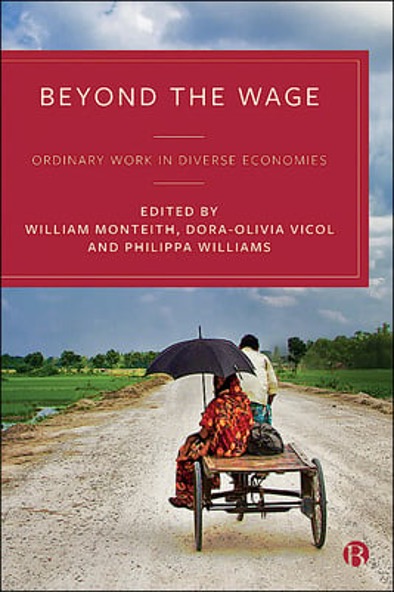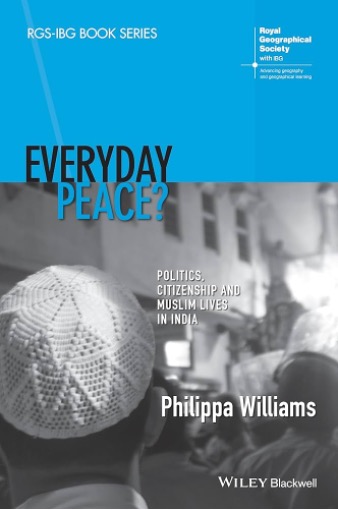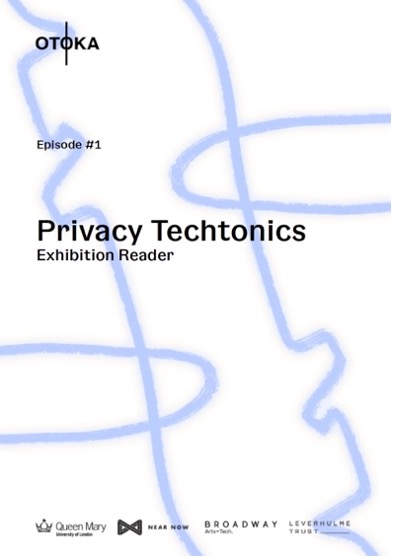Professor Philippa Williams

Professor of Geography, Director of Education
Email: p.williams@qmul.ac.ukTelephone: +44 (0)20 7882 6977Room Number: Geography Building, Room 215
Profile
My research and teaching at Queen Mary intersect political, digital, economic and development geography, with a focus on everyday political and digital life in India and its transnational community. I am interested in questions concerning how the state is experienced, how citizenship is articulated and how marginality, particularly in the context of violence/nonviolence is lived. My latest research examines the geopolitics of digital privacy and WhatsApp in India. I was awarded the Philip Leverhulme Prize in Geography (2019-2022).
Current and previous research projects:
- AI in action: Knowledge, ideology and practice of AI amongst university students (IHSS, QMUL seed corn funding)
- Privacy Techtonics: A Feminist Geopolitics of Privacy, WhatsApp and Democracy in India (Leverhulme, WhatsApp)
- Surviving violence: Everyday resilience and gender justice in rural-urban India (British Academy)
- Ordinary work and everyday life (British Academy)
- Geographies of peace (ESRC)
- Democracy, citizenship and the state - India and the UK (ESRC)
My forthcoming book, Privacy Techtonics: A Feminist Geopolitics of Privacy, WhatsApp and Democracy in India, is co-authored with Lipika Kamra and published with Bristol University Press.
Everyday Peace? Politics, Citizenship and Muslim Lives in India is published by the RGS-IBG Book Series and was awarded the 2016 Julian Minghi Distinguished Book Award by the Political Geography Speciality Group at the American Association of Geographers.
I have an edited books on Geographies of Peace with Nick Megoran and Fiona McConnell and Beyond the Wage: Ordinary work in diverse economies led by Will Monteith and with Olivia Vicol.
At Queen Mary I am a fellow of the Digital Environment Research Institute (DERI) and a member of the South Asia Forum, IHSS Digital Lives network, the City Centre and the Centre on Labour, Sustainability and Production (CLASP). I was previously academic lead for the Resilient Futures India Initiative at Queen Mary’s Global Policy Institute and Secretary of the British Association for South Asian Studies Council. In the School of Geography I was Senior Tutor (2017-2020) and Director of Education (2022-2024 and returning July 2025).
Before joining Queen Mary in 2013 I was a Research Fellow at the Centre of South Asian Studies, University of Cambridge having completed an ESRC-funded PhD in Geography also at the University of Cambridge.
If you’re interested in collaborating, please get in touch p.williams@qmul.ac.uk
Teaching
I am a fellow of the Higher Education Academy and enjoy teaching across our BA/BSc Geography, MSc in Development and International Business and MA Global Development programmes.
Past and current modules at Queen Mary include:
Undergraduate
GEG4015 Sustainable Transitions
GEG5155 Development Geographies*
GEG5103 Geographical Research in Practice
GEG6129 Contemporary India: Politics, Society and the Economy
GEG6007 Readings in Contemporary India
GEG6120 Development Futures: Mumbai Unbound
Undergraduate Dissertation*
Postgraduate
GEG7137 Retheorising Global Development*
GEG7131 Global Working Lives
GEG7130 Democracy, Citizenship and Rights
GEG7120 Geographical Thought and Practice
Masters Dissertation*
*Teaching in 2025-26
Research
Research Interests:
AI in action: Knowledge, ideology and practice of AI amongst university students
This project (in collaboration with Kerry Holden) will examine the evolving AI knowledge and practice cultures amongst university students. There is a stark gap between technologists, educators’ and policy makers understandings of how students use, value and know generative AI tools. Our project aims to locate students AI learning experience within the wider context of AI ecosystems with a focus on three intersecting concerns: 1) Driving AI: Who are the key leaders and drivers of AI in the UK and what is their drive/vision for AI in HEIs. How are the futures imaginaries of AI configured in shaping the present? 2) Framing AI: How are policymakers/advisors and HEIs enabling and framing the use of AI university education? What discourses emerge in higher education contexts that shape collective understandings and future imaginaries of AI? How are students’ engagements with AI structured through discourse? 3) Learning AI: How are students learning, conceptualising and using generative AI tools and with what implications for their learning and development? What data infrastructures facilitate AI in higher education? This emergent project is funded by the IHSS, QMUL seed corn funding.
Privacy Techtonics: A Feminist Geopolitics of Privacy, WhatsApp and Democracy in India
Privacy Techtonics is forthcoming (2026) with Bristol University Press (co-authored with Lipika Kamra). The global dominance of the Meta owned messaging app WhatsApp, and the recent ideological and policy shift by big tech towards digital private spaces raises important questions about the balance between public and private interests in a digital age. Privacy Techtonics examines how as an idea and a practice, digital privacy is infused with power relations, from intimate spaces of everyday life to the board rooms of big tech and the policies of state governments.
Drawing on extensive research India, WhatsApp’s largest market, Privacy Techtonics shifts attention away from western experiences of digital technology and privacy, to centre the ‘digital peripheries’ and ordinary digital technologies. In this crucial context it asks who has a right to digital privacy, how is privacy constructed and regulated by different actors and stakeholders, and what are ordinary ‘citizens’’ expectations and experiences of digital privacy? It examines how and why digital privacy is designed through end-to-end encryption, the legal and regulatory landscapes produced through relationships between big tech and government, and the digital lives of ordinary people. The book concludes that whilst WhatsApp is intended to enhance democratic life, in its largest global market, it is also implicated in undermining everyday democracy.
The research was funded by my Philip Leverhulme Trust Award with the initial phase supported by WhatsApp (with Lipika Kamra, University of Birmingham). Our research was the inspiration for Privacy Techtonics, an art exhibition co-produced with artist and curator Candice Jacobs, both online www.OTOKA.org and in situ at the Broadway Gallery, Nottingham exploring the relationship between digital technologies, privacy, power and politics.
Earlier phases of the research were published in Antipode, Territory, Politics, Governance and Environment and Planning C: Politics and Society.
Project website https://whatsapppolitics.com/
Surviving violence: Everyday resilience and gender justice in rural-urban India
Despite the passing of India’s Protection of Women from Domestic Violence Act (2006), civil society organisations report ongoing societal and infrastructural challenges in reducing the gap between legal and policy provisions, and access to support, services, and justice for survivors of domestic violence. Where access to, and awareness of the law is uneven or lacking, our research with survivor-victims of domestic violence asked: what are the informal, non-legal and everyday practices that women engage in to cope, seek justice, and build resilience in the context of trauma?
This project was a collaboration between academics and civil society organisations in India and the UK and engaged feminist documentary photography in dialogue with survivors’ testimonies to capture, and make visible, the everyday and enduring nature of domestic violence. The research was funded by the British Academy-GCRF (co-PI) and has been published and publicised in regional and national media.
Project website: https://www.survivingviolence.org/
Ordinary work and everyday life
This research contributed new, cross boundary perspectives on people’s relationships to work in India, and global South more broadly. I co-edited a volume on ‘Ordinary Work’ for Bristol University Press led by Will Monteith (QMUL) and with Olivia Vicol (QMUL) that brings together a collection of ethnographic examinations of ‘work’ to disrupt conventional (northern) conceptualisations of waged work. In collaboration with Al James (Newcastle University), Bhaskar Vira (University of Cambridge) and Fiona McConnell (University of Oxford) I have examined questions of worker agency, skills upgrading and socially inclusive growth against the backdrop of India’s economic growth. Our paper on ‘Muslim middle class professionals’ won the Ashby Prize for most innovative paper in Environment and Planning (A) 2017 and used a novel hybrid geographical approach to centre marginalised professionals in the global South.
Geographies of peace
This research challenges the dominance of scholarship within geography and the social sciences that privileges attention on practices of violence at the risk of occluding spaces of peace and nonviolence. My research has been developed in collaboration with Nick Megoran (Newcastle University) and Fiona McConnell (University of Oxford) in Geographies of Peace as well as through my PhD and postdoctoral fieldwork in Varanasi, north India.
My monograph, Everyday Peace? Politics, citizenship and Muslim lives in India was published in 2015 by the RGS-IBG Book Series and was awarded the Julian Minghi Prize, American Association of Geographers, Political Geography Group. Everyday Peace examines how the city produces and is produced through sites and networks of everyday living and working together across difference. It rethinks ideas about citizenship and Muslim identity in urban India and intervenes in dominant thinking about relations between India’s Hindus and Muslims as intractably violent. Instead, it reveals how diverse processes such as cooperation, indifference and friendship more often constitute an everyday urban ‘peace’. A chapter on ‘Peace’ (co-authored with Fabien Cante) is forthcoming in The Wiley Blackwell Companion to Political Geography. Second Edition.
Democracy, citizenship and the state - India and the UK
Underpinning much of my research is a concern with examining experiences of the state, and the intersections between democracy, secularism and citizenship within India and India’s transnational community. It has illuminated the disjunctures between democracy in practice and reality, and the importance of exploring situated experiences of injustice, marginality and subaltern agency. In the UK I have researched the material and lived politics of Indian transnational lives as they encounter the Indian emigration state and the UK’s hostile immigration environment.



Publications
BOOKS
Williams, P and L. Kamra (2026) Privacy Techtonics: A Feminist Geopolitics of Privacy, WhatsApp and Democracy in India. Bristol, Bristol University Press.
Williams, P. (2015) Everyday Peace? Politics, citizenship and Muslim lives in India. Oxford, Wiley Blackwell RGS-IBG Book Series.
EDITED BOOKS
Monteith, W., O. Vicol and P. Williams (2021) Ordinary work: Ethnographies of life beyond wage labour. Bristol, Bristol University Press
McConnell, F., N. Megoran and P. Williams (2014) Geographies of Peace. Eds. London, I. B. Tauris.
JOURNAL ARTICLES
Oza, E., Williams, P., & Kamra, L. (2024). Digital denizenship: Hindu nationalist architectures of digital closings and unbelonging in India. Environment and Planning C, 42(7), 1150-1169. https://doi.org/10.1177/23996544241226813
Kumar, L, P. Williams and P. Johar (2023) Grassroots Authoritarianism: WhatsApp, middle class boundary making and pandemic governance in New Delhi’s neighbourhoods. Territory, Politics, Governance. 11(6): 1121-1140 https://doi.org/10.1080/21622671.2022.2160372
Williams, P and Lipika Kamra with P. Johar, M. Kumar, F. Khan and E Oza (2022) No room for dissent: Domesticating WhatsApp, Digital Private Spaces and Lived Democracy in India Antipode 54(1): 305-33 https://doi.org/10.1111/anti.12779
Williams, P (2019) Emigration State Encounters: The everyday material politics of a diaspora technology Political Geography 68: 1-11 https://doi.org/10.1016/j.polgeo.2018.10.005
Featherstone, D., Björkdahl, A., Chatterjee, I., Jazeel, T., & Williams, P. (2018). Review Symposium for Everyday Peace? Politics, Citizenship and Muslim lives in India, Philippa Williams, Wiley Blackwell (2015), RGS-IBG Book Series. Political Geography. 164-170. https://doi.org/10.1016/j.polgeo.2018.06.001
Williams, P., A. James, F. McConnell and B Vira (2017) Working at the margins? Muslim middleclass professionals in India and the limits of ‘labour agency.’ Environment and Planning (A) 49(6): 1266-1285. https://doi.org/10.1177/0308518X17692324 *Awarded the Ashby Prize for most innovative paper in the journal 2017
Williams, P. (2013) Reproducing everyday peace in north India: process, politics and power Annals of the Association of American Geographers 103(1): 230–250. https://doi.org/10.1080/00045608.2011.652878
Williams, P. (2012) India’s Muslims, lived secularism and practicing citizenship. Citizenship Studies 16(8): 979–995. https://doi.org/10.1080/13621025.2012.735023
Williams, P. (2011) An absent presence: experiences of the ‘welfare state’ in an Indian Muslim mohalla. Contemporary South Asia. 19(3): 263–280. https://doi.org/10.1080/09584935.2011.594157
Chopra, D., Williams, P., & Vira, B. (2011). Politics of citizenship: experiencing state–society relations from the margins. Contemporary South Asia, 19(3), 243–247. https://doi.org/10.1080/09584935.2011.596275
Williams, P. and F McConnell (2011) Critical geographies of peace. Antipode. 34(4): 927–931. https://doi.org/10.1111/j.1467-8330.2011.00913.x
Williams, P., B. Vira and D. Chopra. (2011) Marginality, agency and power: experiencing the state in contemporary India Pacific Affairs 84 (1): 7–23. https://doi.org/10.5509/20118417
Williams, P. (2007) Hindu Muslim Brotherhood: Exploring the Dynamics of Communal Relations in Varanasi, North India Journal of South Asian Development 2(2): 153–76. https://doi.org/10.1177/097317410700200201
REPORTS
Williams, P., C. Jacobs and L. Kamra (2022) Privacy Techtonics Exhibition Reader Queen Mary University of London and OTOKA. Available here
P. Williams and Shazia Choudhry with Supurna Banerjee, Preeti Karmarkar, Nandini Ghosh, Girija Godbole, Ruchira Goswami, Kolika Mitra and Swarna Rajagopalan (2023) Surviving Violence: Everyday resilience and gender justice in rural-urban India. Queen Mary University of London. Available here
CHAPTERS IN EDITED VOLUMES
Cante, F. and P. Williams (2025) Peace In Mamadouh, V., N. Koch, C.Y. Woon and J. Agnew (eds) (2025) The Wiley Blackwell Companion to Political Geography. Second Edition, Hoboken, NJ, USA/Bognor Regis, UK: John Wiley & Sons. Hardback ISBN: 9781119753971
Williams, P (2021) Making the ‘smart heritage city’: Banal Hinduism, beautification and belonging in ‘new India’ Editor István Keul Spaces of religion in urban South Asia. Routledge.
Williams, P. (2017) Moral Geography for International Encyclopaedia of Geography: People, the Earth, Environment, and Technology. Wiley-AAG 1-8
Megoran, N. F. McConnell and P. Williams (2016) Dimensions of Peace: Disciplinary and Regional Approaches. In Dimensions of Peace: Disciplinary and Regional Approaches Richmond, O., S. Pogodda and J. Ramovic. Palgrave Macmillan. 123-138.
Williams, P., N. Megoran and F. McConnell (2014) Introduction: Geographical Approaches to Peace In Geographies of Peace. McConnell, F., N. Megoran and P. Williams, eds. London, I. B. Tauris. 1-28
Williams, P (2014). Everyday Peace, agency and legitimacy in north India In Geographies of Peace. McConnell, F., N. Megoran and P. Williams, eds. London, I. B. Tauris. 194-211
Williams, P. and F. McConnell (2014) Geographies of Peace, Geographies for Peace In Geographies of Peace. McConnell, F., N. Megoran and P. Williams, eds. London, I. B. Tauris. 194-211
Williams, P (2014) Working narratives of inter-community harmony in Varanasi’s silk sari industry In Failed development and identity politics: India through the lens of Uttar Pradesh Jeffery, R. C. Jeffrey and J. Lerche. London, New Delhi: Sage. 250-260
Williams, P. (2011) Hindu-Muslim Relations and the ‘War on Terror’ In The Companion to an Anthropology of India. I. Clarks- Deces, ed., 241–259. Oxford:
Media
Williams, P Interview for BBC World Service ‘Tech Tent’ in ‘WhatsApp: We speak to boss Will Cathcart’ 13 March 2023
Williams, P, S. Rajagopalan, G. Godbole and R. Goswami. Still a nightmare for domestic violence survivors. The Hindu (Indian broadsheet) 29 November 2022
Williams, P and L. Kamra (2021) WhatsApp’s controversial privacy update may be banned in the EU – but the app’s sights are fixed on India. The Conversation 13 May 2021
Kamra, L and P. Williams (2019) Strategies to tackle extreme speech on WhatsApp must bring together socio-political, digital worlds, Scroll 11 May 2019
Williams, P and L. Kamra (2019) India’s WhatsApp election: political parties risk undermining democracy with technology, The Conversation 28 February 2019
Supervision
Current PhD Students
Shruti Arora (with Sydney Calkin) PhD-QMUL Abortion and Reproductive Politics and Digital Health Technologies in India. QMUL Doctoral Studentship Award
Natasha Sharma (with Will Monteith) PhD – QMUL: ‘I May Scavenge Through Dirt, But I Don’t Do Dirty Work’! The Work-Lives of Kolkata’s Manual Scavenging Communities (2019-) QMUL Doctoral Studentship Award
Completed
Sofia Negri (with Sam Halvorsen) PhD-QMUL: Working and organising flexibly through digital-urban spaces: the spatial and political composition of delivery platform workers in Argentina (2020-24) QMUL Doctoral Studentship Award
Ekta Oza (with Catherine Nash) PhD - QMUL: Childhoods under Military Occupation: everyday experiences, resistance and citizenship for children and young people in Kashmir QMUL Doctoral Studentship Award (2020-24)
Kavita Dattani (with Kavita Datta) PhD – QMUL: A Suitable Swipe: Leisure, Pleasure and Dating Apps in Mumbai. ESRC LISS DTP 1+3. (2018-22). Kavita is an Assistant Professor in the Department of Gender, Women and Sexuality Studies at the University of Washington, USA following a postdoc at the Oxford Internet Institute.
Faith Taylor (with Catherine Nash) PhD-QMUL: Love in the Time of Precarity: Reproduction and Intimacy Among Millennials in Hackney (2016-19) QMUL Arts and Humanities Studentship
Eimear Kelly (with Catherine Nash) PhD-QMUL: Alternative forms of Irish dance (2015-2019) ESRC 1+3 Studentship
Aditya Ray (with Al James). PhD – QMUL: Work in India's New Service Economy: Employee experiences in the domestic voice‐based consumer‐interaction industry in Pune QMUL Doctoral Studentship Award (2014–18). Aditya is a Senior Lecturer in the Department of Geography and Environmental Management at UWE Bristol, UK following an
ESRC postdoc at the Open University.
Future Students
I would be excited to hear from students interested in the following areas, preferably in, but not limited to, India/South Asia:
- Digital politics/geopolitics and the politics/geopolitics of digital technologies
- Citizenship
- The everyday state/experiences of the state
- Political economy of violence and non-violence
- Geographies of peace
Public Engagement
I collaborate with civil society organisations, artists and photographers and engage with a variety of audiences through seminars, art exhibitions, blogs, training workshops and materials, animations, reports, policy briefs, podcasts and interviews. Our research has been published and publicised in the UK and Indian media and broadcast on the BBC World Service. For further information see project websites:
https://www.survivingviolence.org/
https://whatsapppolitics.com/
www.OTOKA.org [Privacy Techtonics #Episode 1]